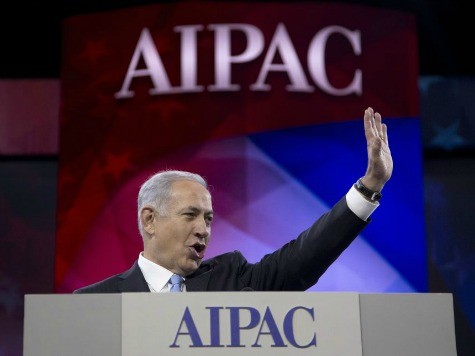The American Israel Public Affairs Committee (AIPAC) convened its annual Policy Conference from March 2-4. Below is a general synopsis highlighting 5 key points from the conference.
1. Two-State or Bust
Of the dozens of expert panels throughout the 3-day conference, none were dedicated to discussing alternatives to the much-maligned two state solution. It is clear that AIPAC still remains committed to the two-state solution, which calls for “two states for two peoples.” However, that has not stopped viable alternatives from being presented in other pro-Israel circles.
For example, Israel’s Deputy Defense Minister Danny Danon lays out his plan for regional peace in Israel: The Will to Prevail. Danon argues that in order for peace to be truly attainable, regional partners, specifically Egypt and Jordan, need to take responsibility for resolving regional turmoil. Jerusalem Post columnist Caroline Glick recently penned her own manifesto, titled The Israeli Solution: A One-State Plan for Peace in the Middle East, advocating for Israel’s eventual annexation of the West Bank, or Judea and Samaria. For further info, read Joel Pollak’s interview with Glick at Breitbart.
2. The Washington Establishment Is Here
The most prominent speaking slots in the 14,000 seat conference hall during the General Sessions were given to long-time representatives of Washington’s political establishment. Senator John McCain (R-AZ) and House Majority Leader Eric Cantor (R-VA) represented the Republican Party, while House Minority Whip Steny Hoyer (D-MD), Senator Chuck Schumer (D-NY), and Senator Robert Menendez (D-NJ) represented the Democratic Party. The 5 members of Congress have together accumulated 132 years of representation on Capitol Hill.
The Obama administration was represented through Treasury Secretary Jack Lew and Secretary of State John Kerry.
3. Bibi Rocked the House
In the early hours of a frigid Tuesday morning in Washington, the Israeli Prime Minister brought the 14,000+ attendees to their feet on countless occasions. Directly contrasting the Obama Administration’s “Strong Diplomacy” approach with Iran, Netanyahu refused to accept Iran’s nuclear enrichment as acceptable to the international community. “If we allow this outlaw terrorist state to enrich uranium, how could we seriously demand that any other country not enrich uranium?” he asked. Netanyahu remained steadfast in his belief that true peace could be attained between the Israelis and the Palestinian people. He refused to capitulate to the international communities demands, stressing the need for the Palestinian leadership to accept Israel as a Jewish State as a necessity for lasting peace.
4. Kerry Met with Silent Treatment
The attendees appeared disinterested and dismayed throughout the vast majority of John Kerry’s speech, which ranged from Iran diplomacy to Israel-Palestinian negotiations. Recognizing the general atmosphere in the conference hall, BuzzFeed’s Rosie Gray tweeted, “AIPAC crowd doesn’t seem to be buying Kerry’s sales pitch on Iran diplomacy.” The seemingly politically inclined crowd must have taken notice of the Secretary of State’s recent commentary on the Israeli-Arab conflict along with his instance upon further negotiations with the Islamic Republic of Iran.
In October, Kerry seemed to have taken a direct jab at Netanyahu. In response to the Israeli Prime Minister’s warnings concerning Iran, Kerry exclaimed, “Some have suggested that somehow there’s something wrong with more diplomacy… We will not succumb to those fear tactics and forces that suggest otherwise.” The next month, Kerry would later seem to threaten the Israelis with “further isolation” and a “third Intifada” should Israel not meet his demands in the ongoing Israeli-Palestinian talks. These comments were received as extremely offensive to Israel’s community at large when considering the fact that countless lives were lost in the previous Intifadas, which consisted of coordinated Palestinian campaigns of terror against the Jewish citizens of Israel.
5. Uncertainty
AIPAC’s reputation as a powerhouse on Capitol Hill has suffered immensely under the Obama Administration. Most recently, AIPAC withdrew its immediate support for additional sanctions upon Iran. Initially it seemed like a no-brainer for a pro-Israel advocacy group to support whatever means possible to check the power of a regime sworn to Israel’s destruction. However, some argue that the move was motivated by the need to retain what little political capitol AIPAC had left with the Obama Administration.
Caroline Glick of the Jerusalem Post argued, “AIPAC did not cut and run from the Iran sanctions fight because it consecrates two-party initiatives. It walked away because it lost.” Many in the pro-Israel community seem deeply worried that AIPAC’s expressed mission, “to strengthen, protect and promote the U.S.-Israel relationship in ways that enhance the security of Israel and the United States,” has not been carried out successfully or sufficiently.
The question remains: will AIPAC maintain its current posture as a reactionary group appeasing the political winds of DC? Or will they ultimately be forced to change course, and directly and overtly combat the Obama Administration’s continuing hostility towards Israel?
Follow Jordan Schachtel on Twitter: @JordanSchachtel.

COMMENTS
Please let us know if you're having issues with commenting.